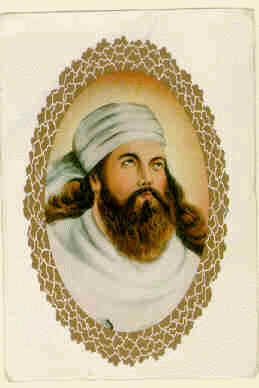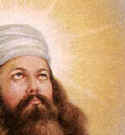About Zarathushtra
The Life & Times
Introduction
 It is a well-known fact that very little
documentary evidence about the times and life of Zarathushtra has reached our times. In
fact the major piece of documentary evidence that has reached us is the text of his Divine
Songs, the Gathas.
It is a well-known fact that very little
documentary evidence about the times and life of Zarathushtra has reached our times. In
fact the major piece of documentary evidence that has reached us is the text of his Divine
Songs, the Gathas.
Historians have tried to reconstruct Zarathushtra’s life mainly with this one piece. However, they face a very challenging task, since this is not meant to be a biographical account, nor even a historical account of his times, but poetry describing Zarathushtra’s spiritual philosophy and worldview. Trying to reconstruct his life from this text is like trying to discover about Shakespeare through his works; not his entire works, but only one of his plays.
Nevertheless, there are sufficient indications to be able to piece together some basic background information. However, this has left ample room for various mythologies to evolve around his life. This text will discuss both documentary aspects of his life, as well as mythical stories.
Summary overview:
Birth
| Place: | North Eastern ancient Iran |
| Date: | 2nd millennium BCE, probably around 17th Century BCE |
| Father: | Pourushaspa |
| Mother: | Dughdova |
| Grandfather: | Haechadaspa of the Spitama family. |
Personal details
| Wife: | Hvovi |
| Children: | 3 sons and 3 daughters in the following order: |
| Son: Daughter: Daughter: Son: Son: Daughter: |
Isat Vastar, Freni Thriti Urvatat-Nara Hvare chithra Pouruchista |
Teens and youth:
Not much is known about his youth except that he was very curious and wanted to find out about things. He spend a long time outdoors, contemplating nature and the questions of life.
Illumination:
| Age: | 30 |
| First converts (in order of acceptance of his philosophy): | |
| His cousin, Maidhyoimangha His wife, Hvovi His 6 children And 14 others over the next few years. |
|
Challenges:
Zarathushtra encountered many difficulties and challenges imposed on him through the opposition of the established priests and local ruling princes. He tries to promulgate his teachings, but every time, the established traditions, what people were used to, manage to stop him. Eventually he and his followers leave their homeland for other lands. Still anywhere they go, they meet similar opposition from both rulers and priests.
Breakthrough:
Finally, in the land of King (Kavi) Vishtaspa, he manages to get an audience with the king. During this encounter, many of the leading priests and wise men were present, to quiz Zarathushtra and test his new philosophy.
Zarathushtra manages to answer all questions to the satisfaction of the King, who after a few days of pondering the situation, embraces this new religion and urges his subjects to do the same. This was the major breakthrough in Zarathushtra’s propagation of his message.
Two of the noted disciples of Zarathushtra, as mentioned in the Gathas, are Frashaoshtra and Jamaspa of the Hvogva family.
Later on, Zarathushtra’s daughter, Pouruchista gets married. In the Gathas, Zarathushtra advises his daughter as well as all brides and grooms-to-be, but does not name the bridegroom. However, later tradition says that she marries Jamaspa.
Death:
Zarathushtra lived a healthy life to old age. According to later tradition, Zarathushtra passes away at the age of 77, of natural causes.
For more detailed information, click on the following:
The following is a list of some links that describe the life and times of Zarathushtra. They vary from a liberal to an orthodox perspective. Listing these links here is just to outline a broad perspective of history, and is not intended as an academic exercise. Please use your own Good Mind as to which version or combinations thereof you would like to adopt as your understanding.
- Zarathushtra's Life by Zarathushtrian Assembly
- Zarathushtra's Entire
Life Story for the Young
by Traditional Zoroastrianism Home pages - Zarathushtra: Prophet & Founder by Hannah Shapero
- Zoroaster - by Persia.net from Microsoft Encarta
Home |
Cyber-Temple | Gathas |
Homage unto Ahura | Zarathushtra |
Intro to Gathas | Articles |
Books | Links |
Gallery
Search | What's
New | Guest book |
Site
Map
